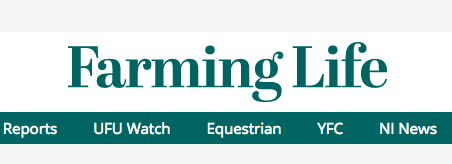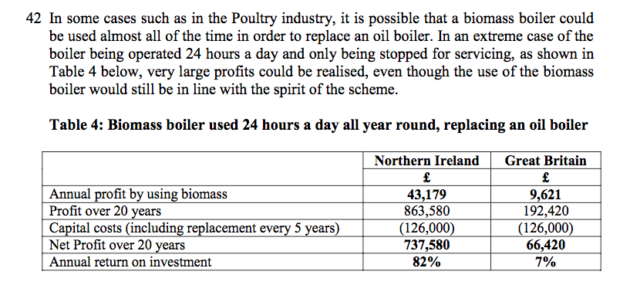You spend £1 to buy some wood pellets. And I’ll give you £1.60 as a thank you. Perhaps if someone had boldly used this in their advertising, the flaws in the Renewable Heating Incentive scheme would have developed greater prominence much faster!
The headline RHI figure is £400 million over twenty years; £20 million a year. Huge sums. For some businesses with modest heating costs – offices or car show rooms – the it might amount to £5-10,000 a year. But for a small number, the figures are much larger.
How huge?
 Back in August 2014 the case study of a Tyrone poultry farmer was published in the Farming Life It’s an interesting insight into how the scheme was portrayed and promoted before the spike in applications
Back in August 2014 the case study of a Tyrone poultry farmer was published in the Farming Life It’s an interesting insight into how the scheme was portrayed and promoted before the spike in applications
“he expects his costs to have been reduced by around £40,000 in a full year”
The paper explains:
The forward-thinking firms are proving the value of turning green ambitions into on-farm realities, saving money and reducing their carbon footprint by tapping into the Renewable Heat Incentive (RHI), which offers hard-pressed farm businesses the chance to benefit from zero cost heat for the next 20 years. [emphasis added]
With promotion like that, you can see how easily a spike in interest and applications was produced.
The case study farmer’s reduction in energy costs accumulates to around £800,000 over twenty years for his heat intensive business, entirely above board and using the Renewable Heat Incentive scheme as intended. Those figures are certainly not “chicken feed” and are in line with an example given in this summer’s NI Audit Office report (page 110) which explains:
“very large profits could be realised, even though the use of the biomass boiler would still be in line with the spirit of the scheme”
 Normally, Northern Ireland businesses suffer from increased travel costs when shipping produce to Great Britain or beyond. This level of state intervention could make a previously gloomy business plan turn viable (for twenty years).
Normally, Northern Ireland businesses suffer from increased travel costs when shipping produce to Great Britain or beyond. This level of state intervention could make a previously gloomy business plan turn viable (for twenty years).
Brites are a Fermanagh-based manufacturer of wood pellets (a common renewable heat source). Their website includes case studies of large buildings like Skainos in East Belfast (which was designed to have a range of sustainable features including solar thermal panels to heat water) and the Manor House Hotel in Co. Fermanagh, some of whom may have installed their wood pellet boilers before the RHI scheme was launched.
Paula Keelagher is brites’ Market Development Manager. Back in 2014 she told the Farming Life (quite possibly through a press release given how the article reads) about the background to the RHI scheme:
“Our government is tasked with achieving a target where 12% of all heating comes from renewable sources by 2020. To assist in achieving this, the Department of Enterprise, Trade and Investment (DETI) launched the Renewable Heat Incentive (RHI) in 2011, the world’s first long-term financial support programme for renewable heat that provides payments to commercial users.”
As Peter Doran posted last week, the EU State Aid decision terms may have been broken given the design and execution of the scheme. Though the EC seems to think the scheme is complaint based on available information.
Aside from the lack of tiering, and the enormous sums that benefit the largest energy consumers, the RHI scheme must surely have skewed the local energy market. Old suppliers of heating oil to rural businesses would have lost considerable custom from canny poultry farmers, as sources of fuel swapped over in this annual £20 million state-sponsored intervention in the local energy market.
Alan Meban. Tweets as @alaninbelfast. Blogs about cinema and theatre over at Alan in Belfast. A freelancer who writes about, reports from, live-tweets and live-streams civic, academic and political events and conferences. He delivers social media training/coaching; produces podcasts and radio programmes; is a FactCheckNI director; a member of Ofcom’s Advisory Committee for Northern Ireland; and a member of the Corrymeela Community.
Discover more from Slugger O'Toole
Subscribe to get the latest posts to your email.
